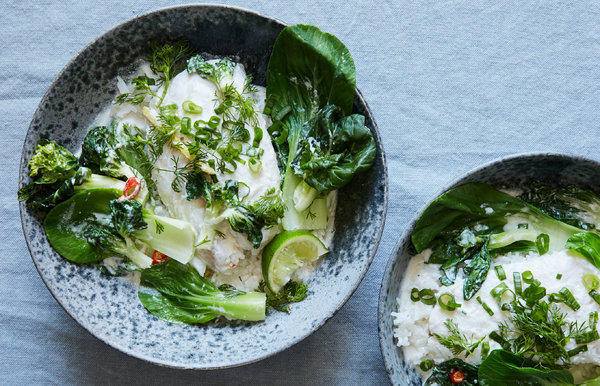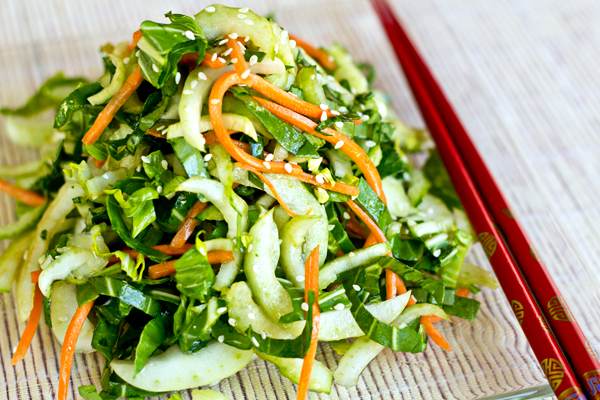Bok choy: Nutrient-dense vegetable that fights cancer
 |
Why is bok choy good for you? As a part of a powerful group of vegetables called cruciferous vegetables (also referred to as veggies in the Brassica family), bok choy isn’t just a great source of vitamins and minerals — it’s also been shown to help prevent cancer. It’s also one of the top anti-inflammatory foods on the planet, giving it the ability to reduce the risk for conditions like heart disease.
Think kale is too bitter? Can’t eat collard greens without adding salt? Bok choy may be your new go-to superfood. Its mild, sweet flavor and crispy texture make it a great addition to any dish whether raw or cooked, as well as an alternative to other dark leafy greens.
Bok Choy Nutrition Facts
Why is bok choy a superfood? It’s a part of a powerful group of vegetables known for incredible health benefits through detoxification. Brassica vegetables provide health-promoting phytochemicals, such as vitamins, carotenoids, fiber, soluble sugars, minerals, glucosinolates and phenolic compounds.
Bok choy is a great food to incorporate into your diet because of its low calorie content and many health benefits, such as cancer prevention, healthy digestion, and a hefty serving of many vitamins and minerals.
It provides an insanely high level of vitamin A and C per serving. For example, a one-cup serving provides 140 percent of your recommended daily allowance of vitamin A and over 75 percent of vitamin C. From antioxidants and an impressive number of phytonutrients to an abundance of minerals like iron, calcium, manganese and folate, bok choy can benefit almost every system in the body.
 |
Bok Choy and Mushroom Stir-Fry.
9 Bok Choy Benefits
1. Helps Treat and Prevent Cancer
Incorporating bok choy into your regular diet can help decrease inflammation, fight free radical damage and give your body some of the most powerful tools it needs to fight disease. Cruciferous vegetables are known for their glucosinolates, sulfur-containing chemicals that sometimes cause a bitter flavor. During the preparation, chewing and digestion of these vegetables, other compounds — such as indole, nitrile and sulforaphane — that have proven anticancer effects are created. These compounds are effective against cancer because they can do things like help protect cells from DNA damage and inactivate carcinogens. This is partly why cruciferous veggies are some of the top cancer-fighting foods around.
Bok choy also contains brassinin, an antimicrobial and often antioxidative substance that’s a proven chemopreventive agent. Many studies have shown that inpiduals who consume multiple servings of cruciferous vegetables per week are at a lower risk of cancers, specifically prostate, colorectal, lung and breast cancer.
2. Provides Antioxidant Power
Bok choy is among the top three vegetables on the aggregate nutrient density index. This means it delivers one of the highest levels of nutrients per calorie compared to other foods. Can bok choy help you lose weight? It may help you feel satisfied without overeating, which is why including vegetables in your diet is important for appetite control.
Free radicals can wreak havoc on the body, yet high-antioxidant foods like bok choy do a great job at scavenging these disease-causing molecules. Just one cup of this leafy vegetable can provide substantially more than your RDA of vitamin A and vitamin C, both of which are some of the most powerful antioxidant vitamins in the body. Beyond these traditional antioxidants, there are a number of phytonutrients and phenolic acids in cabbage varieties — such as caffeic acid, p-coumaric acid, ferulic acid and myricetin— that activate a number of beneficial antioxidant activities. When fermented, antioxidants in cabbages also become more bioavailable, according to some research.
3. Reduces Inflammation
Many of the polyphenols found in this form of Chinese cabbage help reduce inflammation. Bok choy also provides vitamin K, which helps lower the risk of unwanted inflammation, which is at the root of many illnesses and can cause considerable damage if left untreated.
4. Promotes Eye Health
Carrots are popularly known as the vegetable that helps keep eyes healthy, but thanks to substantial amounts of vitamin A and beta-carotene, bok choy is a serious contender. One cup provides the RDA of beta-carotene and over half of the RDA of vitamin A. The beta-carotene levels are high enough that the Macular Degeneration Association highly recommends it as a food that can help inpiduals suffering from macular degeneration — an eye disease that causes vision loss.
Aside from being an antioxidant that can help prevent infection, vitamin A is also very effective at preventing cataracts since it fights free radicals that damage our eyes and the rest of the body. Vitamin A foods can also help improve low-light vision and treat dry eyes and other eye-related diseases.
5. Strengthens Bones
Bok choy has a stellar lineup of nutrients that help promote bone health — including iron, calcium, phosphorus, magnesium and bone-building vitamin K. In addition, this superfood is a much healthier alternative to fat-filled milk for getting the RDA of calcium and preventing calcium deficiency.
The primary mineral found in bones and teeth is made with calcium and phosphorus. Vitamin K is proven to increase bone density in osteoporotic inpiduals, as well as reduce fracture rates. The combination of these minerals greatly contributes to the growth and maintenance of healthy bones and muscles.
 |
Coconut-Poached Fish With Bok Choy.
6. Lowers Blood Pressure and Promotes Heart Health
As a calcium- and potassium-rich food, bok choy naturally lowers blood pressure. Potassium also helps process sodium, which reduces the damage sodium does to the cardiovascular system. Vitamin K also helps with proper blood clotting.
The vitamin B6 and folate in this nutrient superstar help prevent the accumulation of a compound called homocysteine. When too much is created in the body, it can lead to damage to blood vessels and heart problems.
7. Benefits Healthy Skin and Hair
One serving of bok choy provides almost three quarters of the daily recommended levels of vitamin C. Vitamin C helps grow collagen, a protein needed to keep skin and hair healthy. As a vitamin C food, the healthy levels of collagen help smooth wrinkles and improve complexion. The antibacterial qualities of this veggie also help combat skin infections like acne and eczema.
8. Boosts the Immune System
Vitamin C is at the forefront of why this powerful veggie is an immune system booster. It’s a powerful antioxidant that helps bolster and maintain a healthy immune system. Selenium, another mineral found in bok choy, also helps stimulate production of killer T-cells. Incorporating it into meals could be a way to fight off common illness throughout the year.
9. Assists in a Healthy Pregnancy
Bok choy, along with many other leafy greens, provides a great serving of folate. During pregnancy, the body’s need for folate doubles due to the rapid growth and pision of cells. Consuming enough folate foods and folic acid helps prevent birth defects like spina bifida and anencephaly and provides a number of other benefits to keep you and your baby healthy throughout your pregnancy.
 |
Crisp Baby Bok Choy Greens in Tangy-Sweet Sesame-Soy Vinaigrette.
History and Uses
Bok choy has roots in traditional Asian cooking, but it’s been integrated into many different world cuisines over the past century or so. While it is also referred to as Chinese cabbage, these two vegetables are actually different species, although closely related.
Bok choy and other Chinese cabbage varieties have been enjoyed as part of Chinese, Filipino, Korean, Vietnamese and other Asian cuisine for thousands of years. It was introduced to Europe in the 1800s and is now widely produced in Canada and the U.S.
The Chinese consider food their medicine, which is probably why nutrient-rich cabbages are staples in Chinese cuisine. In addition to its other names, bok choy is sometimes called “soup spoon” because its stalk and leaves resemble a spoon.
Kimchee is the Korean name for pickled bok choy, which is a recipe that is likely thousands of years old. While kimchi is traditionally made with napa cabbage, many kimchi variations exist, including a recipe made with bok choy, carrots, radishes, other cabbages, and dried shrimp or fish.
Precautions
Bok choy is commonly referred to as “goitrogenic.” This means it contains chemicals that can interfere with the production of thyroid hormones. For people with thyroid dysfunction, there is concern cruciferous vegetables and other goitrogenic foods are related to inflammation, iodine metabolism issues and overall thyroid malfunction.
More up-to-date research has shown that very few circumstances allow for goitrogenic foods to have a negative effect on the thyroid, and the number of beneficial nutrients found in foods like bok choy outweigh concerns about the thyroid. If you suffer from thyroid issues, speak with your doctor before consuming bok choy./.
( Jillian Levy )
Most read
Recommended
 Handbook
Handbook
Vietnamese Turmeric Fish among Best Asian Dishes: TasteAtlas
 Handbook
Handbook
From Lost to Found: German Tourist Thanks Vietnamese Police for Returning His Bag
 Handbook
Handbook
Prediction and Resolution for the Disasters of Humanity
 Handbook
Handbook
16 French Films To Be Shown For Free During Tet Holiday In Vietnam
Popular article
 Handbook
Handbook
Unique Cultural and Religious Activities to Welcome Year of the Snake
 Handbook
Handbook
Reflection on Snakes
 Handbook
Handbook
Dream of Snakes
 Handbook
Handbook








